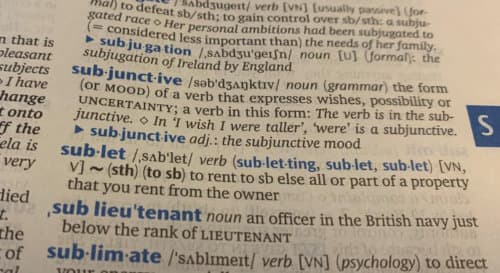

Read our Blog !
- Details
(Level B2+ The once celebrated and now forgotten Johann Kaspar Lavater of Zurich)
Swiss writer, poet, philosopher and pastor, Johann Kaspar Lavater (below), born in Zurich in 1741, was for much of his life one of the most celebrated men on the planet. He was visited by royalty, loved by Goethe, read rapturously and religiously around the world, feted by the great William Blake and an inspiration for writers such as Balzac, Charles Dickens, Thomas Hardy and Charlotte Bronte.
- Details
(Level B2+) Text about Luddism, with vocabulary exercise.
Written and compiled by Benedicte Gravrand, at The Language House
The term “Luddite” is used to describe individuals or groups opposed to technological change. It was first used used during the Industrial Revolution and is still relevant today.
The word “Luddite” probably comes from Ned Ludd, a young English worker (see below) who attacked and destroyed two mechanical weavers in 1779 in a fit of rage.
- Details
Learning English abroad means more than classes and textbooks; it's an adventure, new friendships, and a journey of self-discovery.
- Details
(Level B2 and above) – Longevity biotech, idioms and phrases related to age.
At 67, Dr Tyger is no spring chicken. In fact, he is starting to show signs of age. He has quite a few senior moments too, like losing his lab coat or losing both his keys and glasses last week. But he refuses to act his age – he still goes paragliding and mountain climbing for example. His dynamism shows that age is just a number. In fact, he plans on living healthily to a ripe old age. That’s why he runs longevity biotech research projects.
- Details
After discovering calculus, the reflecting telescope, the nature of light and colour, and revealing the laws of gravity, motion, and cooling, the brilliant English scientist and godfather of the Age of Enlightenment, Sir Isaac Newton decided it was time for a radical career change.
- Details
A short story collaboration by Maria Duran and Garry Littman
- Details
Olena is an English language trainer from Ukraine now living in France. She spoke to Garry Littman about her experience during the ongoing war. (Level B2 +)
I wake up every morning at around 5.30am. Bang. I’m awake. Falling back into a warm slumber is out of the question. The moment I open my eyes a little seismic shock of fear and stress ripples through me. My overworked adrenalin kicks in. Bang. I’m awake. A collection of hi-resolution images force themselves onto the screen of my consciousness. They have a life of their own. That’s what war does.
- Details
(Level A2 and above: On the difference between their, there, and they’re, with examples and exercise)
There are two children in this picture. As you can see, they’re taking photographs in their garden.
Yes, this blog is about the difference between there, they’re and their. As they are homophones (words that have the same sound, but different spellings and different meanings), they can be a little confusing.
- Details
(Level B2 and above)
Photo: Martin Luther King Jr (left) and Malcom X.
Written and compiled by Benedicte Gravrand, English trainer at The Language House in Geneva
In North America, February is Black History Month – also known as African American History Month. The rest of the world is not always aware (informé) of this event, but it is a very important one.
- Details
(Level B1 and above: On the difference between who, whom, whose and who’s, with examples, video and exercise)
Written and compiled by Benedicte Gravrand, English trainer at The Language House in Geneva
Mark is a very demanding boss who pays attention to detail and knows exactly who’s who and who’s doing what.
- Details
The Collins Dictionary has chosen the word permacrisis as its word of the year for 2022.
It’s known in grammatical circles as a portmanteau, a word that combines the meaning of two others – (permanent + crisis).
- Details
(Level B2 and above: On the difference between irony and sarcasm, with examples, quiz, videos and vocabulary exercise)
Written and compiled by Benedicte Gravrand, English trainer at The Language House in Geneva
When we hear verbal irony, we often assume it is sarcasm – but there is one small difference between irony and sarcasm. Here’s a brief elucidation that we hope will help you spot the difference during your future comedy viewings.
- Details
(Level B1 and above: the Disney family ancestors were French)
Written and compiled by David Creber, senior trainer at The Language House in Geneva
We all know that Disney is American. It’s as American as apple pie and Mickey Mouse. But did you know that Walt Disney’s ancestors were more likely to have preferred a tarte aux pommes followed by du pain et du fromage ?
Yes, Disney was French! Here’s a Disney fairy tale that is much less well known – of a family from Normandy making a name for itself in the land of opportunity.
- Details
(Level B2 and above: the origin of Black Friday)
Black Friday has now become a global phenomenon. The Day of Deals. Bargains galore (à gogo) for the brave. But, why black? There are a few historical references. The most recent can be traced back to Philadelphia police in 1960s who called it a black day, feared and dreaded by law enforcement, public transport employees and taxi drivers....
- Details
(Level B2 and above: On the subjunctive, with examples, phrases and video)
Written and compiled by Benedicte Gravrand, English trainer at The Language House in Geneva
In the 20th century, British English tried to avoid using the subjunctive, seeing it as old and pedantic, and promoted the use of “should” instead. But thanks to American English which kept the subjunctive alive and well, the use of “should” has declined on the islands as the subjunctive has returned.
- Details
(Level B2 and above. Expression: An albatross around one’s neck)
After the US mid-term elections, Donald Trump, who once boasted “we’re gonna win so much, you may even get tired of winning”, has earned a new title, “the albatross around the neck of the Republican Party“.
- Details
(Level B1 and above. Idioms and expressions involving dogs and cats)
Dogs and cats. Don’t we just love them? There are dozens of expressions or idioms that involves cats and dogs. Here is a list of some of our favorite dog and cat expressions with definitions and examples of how to use them.
- Details
(Level C1 and above. About Roger Federer)
Roger transcended tennis. Over the years, we all drained global supplies of superlatives to describe the phenomenon that will always be Roger Federer on a tennis court.
- Details
Level B2 and above: On Liz Truss and British politics, with vocabulary and phrases, video
The appointment of Elizabeth Truss as UK Prime Minister on September 6 was almost immediately eclipsed by the death of Queen Elisabeth two days later. The Queen’s reign of 70 years is in sharp contrast to the revolving door (porte tournante) of Prime Ministers. Truss is the fourth in just over six years.
- Details
Level C1 and above. Rewriting history: The incredible story of King Richard III
History is written by the victors, in this case, the new Tudor dynasty. Richard’s death was end of the Plantagenet dynasty. 400 years later, a disparate group of UK historians revisited the parchments of the era and discovered that Richard was perhaps not such an evil overlord. Then his skeleton was unearthed from under a city car park.
- Details
Level B2 and above: Conspiracy theories: examples and explanations – with related vocabulary and videos
Conspiracy theories are good material to poke fun at – unless you are serious about them. Serious conspiracy theorists see a hidden agenda behind everything; and that’s no fun. No, sir. An evil elite is running the world, and carrying a gun at all time is the answer.
- Details
Level B1 and above: article and vocabulary connected to heatwaves, climate change and glass buildings
Scientists agree that global warming means more and more heatwaves. The world is already on average 1.1-1.3°C warmer than it was in pre-industrial times and as we continue to use fossil fuel, it is set to get warmer yet. We have a wicked problem on our hands.
- Details
Level B1 and above: vocabulary around the word “problem” and different kinds of problems
Do you have a problem? Yes, we all do at one time or another.
A problem to solve (résoudre), a problem to unravel, a problem that is annoying, or maybe a problem that is driving you mad. If you believe the popular interpretation of Murphy’s Law which says, “anything that can go wrong, will go wrong,” then you’re ready to handle (s’occuper de) the inevitable problems coming your way.
- Details
Level C1 and above: all about the Australian elections in May 2022
Last month, democracy called on Australia, as this wonderful, but delicate creature does every three years.
The result was resounding. Australians voted to end a decade of toxic politics. Enough was enough.
- Details
Level C1 and above: the history of pirates
PIRACY is one of our most enduring activities.
First came the boat and piracy quickly followed. It spread across the seven seas and into airspace (aircraft hijacking) and cyberspace where even you, dear reader, have probably indulged in a little piracy.
- Details
(Level B2 and above)
My mother was a most polite woman. Her language was always temperate. She rarely lost her temper. However, if someone or something did make her blood boil (made her very angry) she was likely to exclaim:
Pardon my French, but I think he’s a damn idiot! or Pardon my French, but that’s the stupidest thing I’ve heard for a long time !
- Details
(Level B2 and above: origins and meaning of the term “gaslight”)
Gaslighting is denying reality, with the intention to make another person doubt themselves. It is a form of manipulation that often occurs in abusive relationships. The term is often treated as a modern buzzword, although it has appeared in decades of psychoanalytical studies.
- Details
(Level C1 and above: All about that famous song, A Whiter Shade of Pale) (March 2022)
1967 was a good year for office equipment and a wonderful year for music.
The first electronic handheld calculator went on sale and the Beatles released the album Sergeant Pepper’s Lonely Hearts Club Band.
- Details
(Level C1 and above: The fall of UK Prime Minister Boris Johnson)
Goodbye, Boris. It was short and not sweet. It was tumultuous and riddled with lies and hypocrisy, which was what we expected from you. You were Boris. True to nature.
- Details
(Level B2 and above: Wordle, the new word game)
There’s a new word game in town. It’s the infectious phenomenon called Wordle, a web-based game developed by Josh Wardle. Twitter has identified it as the first major viral trend of 2022. Wordle is unlike most modern-day website games. It makes you think.
- Details
(Level B2 and above: Latin words commonly used in the English language, with exemples)
Many Latin words are used in their original form in many languages, including English. Here are some that are used quite commonly in the English language.
- Details
Level C1 and above
Novax Djokovic is in “detention” in a nondescript hotel in Melbourne, Australia, while squads of lawyers decide if his pandemic papers are valid for him to play in the Australia Open. Djokovic shares his immigration detention hotel, with real victims, who really have been crucified by populism… The world’s number one has been in hotel detention for a less than a week. Many of the guests on adjoining floors have been in detention for about nine years.
- Details
Level C1 and above
December 2021. You may have missed its real significance. Perhaps you were distracted by Christmas, a rolling pandemic and a seemingly endless loop that went something like this: reserve (flights, holidays, tests, Christmas parties), cancel (flights, holidays, tests, Christmas parties) and haggle, plead, beg (reimbursements).
If you had both feet on the ground, you’d know that December 2021 was in fact the month of the millipede (mille-pattes).
- Details
Level C1 and above
The third smallest sovereign nation in the world, after the Vatican and Monaco, is the tiny island of Nauru. The 21 square kilometre island was once a lush tropical paradise. Today, the island is sick and its people are sick. Paradise lost.
This far-flung speck in the Pacific Ocean has a tale to tell about the rapacious nature of the modern human.
- Details
Level C1 and above
Question: What did Groucho Marx and Winston Churchill have in common, apart from their love of cigars?
Answer: They were both brilliant with words and wordplay (jeu de mots) and remain today, the great princes of paraprosdokians.
- Details
Level C1 and above
The USA starts its craziest long weekend today.
Thanksgiving Day is today, Thursday, followed by Black Friday and Cyber Monday.
Of course, there is a story behind each day, that over the years has been shaped to fit to the appetites of modern life, which could be best described as gluttony and consumerism.
- Details
(Level A2 and above: past simple and past continuous)
Mr. Bernstein is a brilliant pianist. Last night, while he was eating in a restaurant with his wife, somebody came into his house and destroyed his very expensive grand piano with a chainsaw (tronçonneuse). The piano was completely demolished, a total mess.
- Details
On se sent fier aujourd’hui. Vachement content même.
Cet article que vous êtes en train de lire est le 100ème à être publié sur notre blog Et Maintenant in English.
- Details
(Level A2 and above)
There are 12 phrasal verbs in this story. Find out what they mean and why they are so important. Learn them and use them. And yes, we know, they are not the easiest part of the English language.
- Details
Level A2 and above
There are lots of expressions in English that involve fish (poisson). They are informal expressions.
But they can be used to make your conversations more colorful and interesting.
- Details
Level C1 and above
The Cosmic Medical Centre was busy, but Humanity had to wait just five minutes before the nurse called them.
“Humanity? Earth, isn’t it? This way please.”
- Details
(Level A2 and above: Idioms and phrases related to sugar and honey – with songs)
Sprinkling (saupoudrer) some sugar on your English is a piece of cake. It can put the icing (glaçage) on the cake. And it’s as easy as pie. For example, you can call your loved ones “honey” or “sweetie” or “sugar”. You can say “isn’t it/he/she sweet?” or, “it was so sweet of you to do that” (sweet: sucré, doux, adorable).
- Details
Level B2 and above
Empathy is a beautiful thing. It is about recognising another and thereby sharing someone’s experience. And we all do it to a greater or lesser extent; it is part of our nature. But can we learn empathy?
- Details
Level B2 and above
“Time” is one of the most-used words in the English language. We talk about time all the time. You can lose time, find time, save time, spend time, make time, take time, give time, call time and run out of time.
- Details
Level C1 and above
(Coffee break June 16, Villa La Grange, Geneva. Time: 14.56pm – 15.09pm. Present: Russian president Vladimir Putin and US President Joe Biden)
- Details
Level C1 and above
I like La Marseillaise, the French national anthem (hymne nationale). It’s inspiring and exhilarating. But then, I found a translation. I now sympathise with French footballers and others who seem to be tongue-tied when it thunders, pre-match or pre-ceremony, over the loudspeakers.
- Details
Level B1 and above
A survey in 2016 found that that the average British person says ‘sorry’ about eight times per day. Not that the British have more to apologise for than others. Besides, ‘sorry’ is not just about good manners which require you to apologise when you have done something wrong. In fact, the British say ‘sorry’ even when they are not at fault.
- Details
Level B2 and above
French comedian and actor Gad Elmaleh calls it the great existentialist question.
It’s a question that has traumatised millions of French people learning to speak English
- Details
Level B2 and above
(COVID nightmare. A true story. Level B2- C2)
The worst night of his holiday in Africa, Roberto recalls, was the night the doctor came to his bungalow.
- Details
Level B1 and above
It pays to reflect on one’s sins (péchés) every now and then. Are you envious? If so, you are a sinner and you are suffering from one of the seven capital sins, according to Christian theology.
Christian theology has dictated the lives of millions of people for centuries, and it does not allow for grey areas; you are either a sinner or you are not. Since none of us is perfect, we are all sinners.
- Details
Level C1 and above
I have an odd relationship with the French public radio station France Culture. I am a little obsessed, not by their sage voices, but by their jingles, those short fragments of music that introduce different programmes.
Page 1 of 3
I want more information about English courses in English
and language travel around the world
English course in Geneva – Cours d'anglais à Genève
Test your English. Do our online test here
All our blogs are written by our trainers.
Director and senior trainer Garry Littman
Trainer, Benedicte Gravrand
Academic Director and senior trainer David Creber



















































